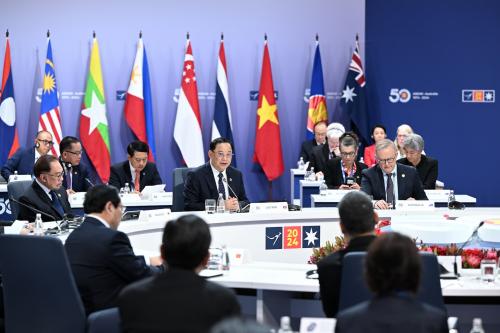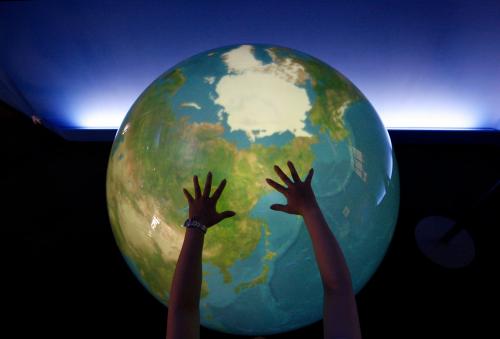Read Thomas Pepinsky’s post on Jokowi’s victory and what it reveals about shifting voting patterns.
This week, Indonesia holds a general election featuring 245,000 candidates running for 20,000 positions, including the country’s president. The event is the world’s largest and most complex single-day election in the democratic world. Brookings experts have written and spoken about various policy topics related to Indonesia. Here are five key facts to know.
Indonesia is the world’s third-most populous electoral democracy.
In terms of population, only India and the United States are larger democracies than Indonesia. Indonesia is also the fourth most populous country in the world. Thomas Pepinsky, a nonresident senior fellow in Foreign Policy at Brookings, analyzes the leadership contest between incumbent President Joko Widodo (aka Jokowi) and former general Prabowo Subianto. This is the Indonesia’s fourth direct presidential election and fifth parliamentary election since it democratized in 1999, “propitious signs,” Pepinsky argues, “of a consolidated and maturing democracy.” Yet he also worries about the possibility of democratic backsliding amid growing dissatisfaction with Indonesian democracy.
Listen to a recent edition of the Brookings Cafeteria podcast, in which Pepinsky and Senior Fellow Jonathan Stromseth discuss Indonesia’s diversity and democracy.
This is Indonesia’s fifth general election since democratic rule began in 1998.
Jokowi and Subianto faced each other five years ago in the presidential contest, but experts Lex Rieffel and Alexander Arifianto write that this election “is arguably more crucial than the previous four.” While predictions about the outcome vary, Rieffel and Arifianto explain that the “one point of consensus among most analysts is that neither of these two candidates is a committed democrat, implying that Indonesia is likely to continue drifting away from democratic rule in the near term.” However, they argue that the best outcome for long-term U.S.-Indonesia relations may be a victory for Jokowi, which could help him fix some of the weaknesses of Indonesia’s democratic political system, especially the role of parliament.
China is Indonesia’s largest trading partner.
Senior Fellow Ted Piccone argues that “the future of the [global] liberal order depends on newer democratic powers picking up the slack” left by declining U.S. leadership and a weakening Europe. Indonesia numbers among these powers. The country, Piccone writes, “is coping with a more muscular version of political Islam and a retrenchment in its regional ambitions.”
Indonesia ranks sixth worst in the world for wealth inequality.
The theme of inequality has featured prominently in the campaign between Jokowi and Subianto. Eve Warburton and Burhanuddin Muhtadi, writing for the Order from Chaos blog, observe that inequality has grown faster in Indonesia than in any other Southeast Asian nation over the last two decades. “Such stark socio-economic disparities,” they say, “have become fodder for populists in recent elections, including this year’s presidential election. Divisive, and often sectarianized, political narratives about inequality have polarized public opinion and contributed to Indonesia’s current moment of democratic decline.”
Islam’s role in Indonesian politics reflects an “uncontroversial conservative consensus”
Senior Fellow Shadi Hamid, author of Islamic Exceptionalism: How the Struggle Over Islam is Reshaping the World (St. Martin’s Press), notes that while Indonesia is often praised as a Muslim-majority national model of democracy and pluralism, it “paradoxically” has more shariah laws than countries in the Middle East. And this comes with popular support. “The implementation of shariah [in Indonesia],” Hamid says, “is part of a mainstream discourse that cuts across ideological and party lines. That suggests that Islamism is not necessarily about Islamists but is about a broader population that is open to Islam playing a central role in law and governance.”
Learn more about Brookings research on Indonesia, and follow our Southeast Asia Insights series to learn about the region.
The Brookings Institution is committed to quality, independence, and impact.
We are supported by a diverse array of funders. In line with our values and policies, each Brookings publication represents the sole views of its author(s).



Commentary
5 facts about Indonesia as it holds national elections
April 16, 2019